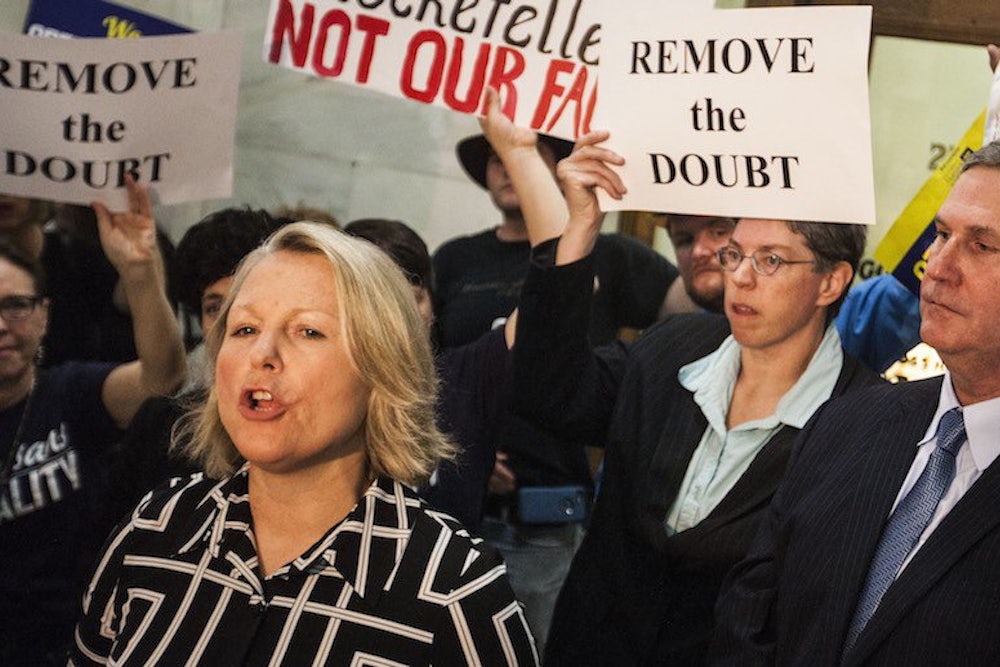Another day, another "religious freedom" bill on the verge of becoming law. The latest comes with a hint of irony: It hails from Arkansas, the home state of President Bill Clinton, the original signer of the federal Religious Freedom Restoration Act—the law now held up by conservative legislatures as the model for religious protections. Clinton himself had nice things to say about the act when he signed it in 1993, noting that it upheld “the principle that our laws and institutions should not impede or hinder but rather should protect and preserve fundamental religious liberties.”
But the cultural climate has changed since, and it seems the Arkansas legislature knows it. The bill approved Tuesday takes things farther than the federal statute and even Indiana’s maligned iteration, by adding language so far unseen in this new wave of legislation.
The bill is similar to the Indiana measure in that it allows any person or business whose “exercise of religion” has been “substantially burdened” to assert the violation as either a claim or a defense in a judicial proceeding. This ostensibly includes cases where a local ordinance compels businesses to not discriminate towards LGBT people.
In the event the victim of discrimination brings suit against the business, the locality would likely join the action, since it’s interested in enforcement of its nondiscrimination edicts. But at that point, the new Arkansas law would require the locality to show that nondiscrimination toward gays and lesbians “is essential to further a compelling government interest.” The italicized language is exclusive to Arkansas, and presumably would lead courts to afford great deference to the religious beliefs of the business owners vis-à-vis the customers or the municipality’s interest in a nondiscriminatory environment.
The bill’s definition of “substantial burden” on religion also seems broader because it specifically singles out any action designed “to prevent, inhibit, or curtail religiously-motivated practice consistent with a sincerely held religious belief”—these are the oft-cited wedding-vendor scenarios. And “religious belief” itself is defined nebulously as “the ability to act or refuse to act . . . whether or not the exercise is compulsory or central to a larger system of religious belief.” It’s not hard to imagine the range of attitudes that fall into this definition—including a flat denial as “God told me it’s wrong for me to serve you.”
Arkansas is also an outlier with respect to equality in that earlier this year, Governor Asa Hutchinson let another bill become law—he neither signed it nor vetoed it—prohibiting local governments from enacting ordinances extending civil-rights protections to gays and lesbians in areas such as employment and housing. In the absence of broad-based statutes that do just that at the state level, municipalities are generally free to pursue heightened safeguards against discrimination. Hutchinson’s inaction effectively trumps those local efforts, and leaves LGBT folks wholly at the mercy of anyone wishing to discriminate.
As happened in Indiana, business interests have spoken out against Arkansas' proposed law. On Tuesday, retail giant Walmart took the extraordinary step to call on the governor to veto the legislation, and a tweet the company sent Tuesday night had CEO Doug McMillon’s name on it:
Our statement on Arkansas #HB1228 pic.twitter.com/KFPd91ejdo
—
walmartnewsroom
The pressure is working. On Wednesday, Hutchinson announced that he won’t sign the new religious-freedom bill as passed, and asked the legislature to recall the bill and modify it to “mirror” the federal version signed by Clinton. That’s a stunning reversal—Hutchinson had earlier promised to sign the law if it landed on his desk. But at Wednesday’s news conference, he acknowledged that there’s “clearly a generational gap” between lawmakers and opponents of the bill, one of whom turns out to be someone from his own family: The governor said his son Seth signed a petition calling on him to veto it.
Whatever the Arkansas legislature does next, Hutchinson’s move signals that the backlash against this wave of religious-freedom bills will at least bring some of them more in line with the one Clinton pushed more than 20 years ago. To be sure, the mother of all RFRAs isn’t perfect and has been vastly expanded by the Supreme Court. But as enacted, it was never destined to ignite the crazy culture war between religion and equality we’re seeing today.
